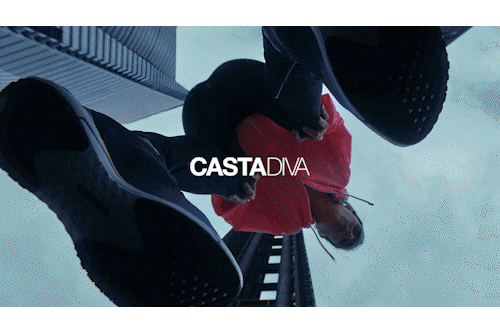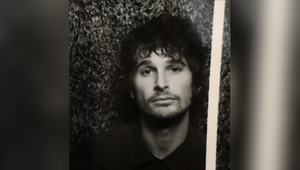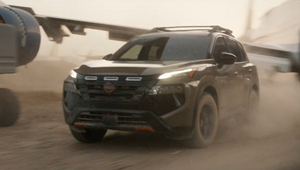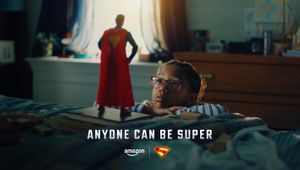
Uprising: Madeline Clayton on Motherhood and Frustration with a Fearful Industry’s Formulaic Work

Australian director Madeline Clayton is making waves in the American commercial directing scene – all while balancing the demands, and miraculous moments, of motherhood. Signed to production company JOJX, she channels her ambitious and reflective nature into meaningful stories, as seen in her short film ‘Nineteen’, and impactful work for the likes of the UN and IKEA.
Madeline now lives in New York with her fellow director husband and daughter, surrounded by an extensive camera and DVD collection – not to mention the city’s myriad inspirations. This chapter of her story is even more immersed in creativity than her previous life as a producer in Australia, and long before that during her imaginative Sydney upbringing.
“Whether it was family videos of magic shows, news reports, plays or live cooking, we were always ‘on stage’,” she says, sharing that this ‘stage’ even materialised physically, when Madeline’s grandfather built one in the backyard. “I was surrounded by creativity at home. My mom was a home cook and cookbook writer, while my dad loved music, drumming and drawing. They weren’t professional artists, but they were incredibly supportive of our artistic pursuits… Performance and storytelling were central to my childhood, and I loved captivating an audience – even with silly stories. Those experiences were formative in nurturing my passion for creativity.”
When it came time to attend college, Madeline originally enrolled in a law and languages degree, before rediscovering her love of storytelling while on a gap year in Italy. Helping a fellow traveller practice lines from their script in a Milan hostel, she realised that the “practical” law route would not be nearly as fulfilling as studying her lifelong passion. Upon returning, Madeline went on to study communications with a major in film studies instead.
The multidisciplinary programme taught her about directing, cinematography, editing, and sound design, giving her a holistic understanding of filmmaking. And after graduating, she then began working as a production assistant and junior producer at Nickelodeon. “It wasn’t always creative – there was a lot of admin – but I gained valuable experience working in a studio environment.”
Her first professional project was a short form titled ‘Nineteen’, a deeply personal story written after the passing of her brother. The film became the director's calling card, screening at international festivals and winning awards, as well as helping her process the grief.
“It gave me my first experience of how personal truth can resonate universally. It was a pivotal – and devastating – moment in our family,” she says. “‘Nineteen’ is about a young man seeking his first sexual experience while also facing death. It was a very emotional process – I dressed the actor in my brother’s clothes and showed him videos of my brother so that he captured his mannerisms. I remember showing it to my mum and she audibly gasped at how much the actor resembled him. It was confronting for my family but also healing.”
She continues, “As a filmmaker, you inevitably bring your life into your work, which can be challenging for friends and family who see themselves reflected in the artwork. But I truly believe art has the power to transform personal truth into something universal. ‘Nineteen’ was the project that changed everything. It opened doors for me into the industry and gave me the confidence to pursue directing full-time.”
In this pursuit, Madeline experienced the long days and sacrifices of production work – “directors without family lives, falling asleep in meetings, total burnout”. She describes it as “torturous to witness” as an assistant, but developed a deep respect for those working the grueling schedules to gain experience and build relationships.
“It was also confronting,” she adds. “10 years ago, female directors weren’t taken as seriously. Things are better now – it’s not as novel anymore, which is great. But back then, I got bad advice from someone 30 years my senior who said, ‘Don’t bother; it’s too hard. Women do well as producers’.”
Feeling burnt out herself, Madeline took the advice and pursued producing at a production company in Sydney, producing documentaries and ads. But her heart wasn’t in it and, she admits, “I wasn’t a good producer - I had too many creative opinions.”
Then in her mid twenties, with a long-term partner, an apartment in Bondi and a full-time job, it was a perfect life on paper – but it wasn’t the life she wanted. “Everything was stable, but I wasn’t stimulated,” she explains. “So, I quit my job, broke up with my boyfriend, sold my furniture, and moved to New York to pursue directing. That’s where I built my network and really committed to developing my filmmaking.”
Moving to the Big Apple with her best friend, who was experiencing similar feelings of stagnation, the pair lived in a loft in Bushwick called The Cloud, which became a creative hub for shooting films, fashion projects, hosting friends and work parties. A “revolving door of energy”, this environment made New York feel fresh and constantly introduced them to new people. “It was instinctual, not overthought,” she says. “We were totally present and creating earnestly. Moving to downtown Manhattan was a real lesson in dreaming, talking, creating and having fun – not for money, just for the love and sheer passion of creating.”
“You’re only as good as the people you work with,” she adds. “Finding people who align with me creatively, who challenge and push the work, is everything. Even now, I look for that in agency calls, I question whether we’re seeing the same vision, and whether they want to push it as far as I do. That time was an education in itself – being free to experiment without constraints like budgets or timelines.”
Today, Madeline chooses projects that excite her, many of which are linked to genuine initiatives making progress and impact in society. A memorable example is her spot for the UN, ‘She’ll Be Right’, which was shortlisted for the Young Directors Award. During the production process, she questioned whether she was the right person to tell the story – “but I believe that the role of a filmmaker is to be like an anthropologist at times and we shouldn’t be limited to only telling stories that directly reflect our personal identity,” she says.
Above: UN Women Australia - 'She'll Be Right'
“Being a storyteller means using our skills and voices to shed light on matters of substance. It doesn’t always need to be political, but at the very least, speak to a deep human or universal truth. It could be as simple as the desire to fall in love. Or to be a good person.”
In this vein, Madeline always aspires to tell emotionally resonant stories that inspire the audience, whether that’s with ads, short films or any other medium. This, however, can be hampered by the realities of commercial filmmaking. “There’s often fear-driven decision-making in the industry, which can stifle bold, meaningful ideas,” she says.
“The industry's focus on safe, formulaic work frustrates me. I believe the best stories come from joy, curiosity, and taking creative risks. There’s a lot of fear in the industry right now. People make decisions to keep their jobs, not necessarily to serve the project. But the best work comes from joy, curiosity, and abundance – not fear. That’s when stories feel fresh and impactful.”
Fresh, diverse stories also come from imaginative hiring, she suggests. “A director who hasn’t shot a car commercial but has a strong storytelling background could bring fresh energy to it. Giving creatives the chance to explore new lanes benefits everyone and keeps ideas alive.”
“Trusting creatives and allowing them to explore new lanes would lead to more dynamic work,” she adds. “The industry is competitive, and it’s hard to create a level playing field. For instance, directors often get pigeonholed – if you haven’t shot a specific genre, it’s hard to break into it, even if you’re qualified.”
The other challenge for directors today, according to Madeline, is telling deep, emotional stories in condensed formats, like six or 15-second social videos. Though she does see a silver lining. “It’s an opportunity to rethink how we tell impactful stories – focusing on singular, powerful moments rather than trying to cram everything in.”
As well as absorbing inspiration from the likes of commercial directors Kim Gehrig and Martin de Thurah, or the magic realism of Alice Rohrwacher, and raw, human performances in Sean Baker’s work, Madeline’s own creative circle in New York is a lifeline of support for pushing boundaries in both short-form and beyond. “Our community values collaboration and experimentation, which has been vital to my growth,” she says. “New York has been great for that and really opened me up to a wonderful network of talented creatives across disciplines.”
One of these catalytic figures is a former colleague; Curfew EP, Kathryn Berk. “She believed in me, and signed me early on and that changed everything. I spent nearly five years at Curfew, building my reel from scratch. By the end, I was directing projects for the likes of Citibank and IKEA and working internationally, and growing in ways I never imagined.”
A recent – and perhaps the most significant – way that Madeline’s life has evolved ‘beyond anything she ever imagined’ was when she became a mother in 2023.
“It’s become my greatest source of inspiration and grounding,” she says. “I don’t think we give working mothers, creative or not, enough credit. It’s amazing to see mothers with young children producing any work. It’s miraculous and common at the same time. In some ways, it’s expected, and there’s a lot of pressure on mothers to be girl bosses. So I’ve actively tried to take that pressure off myself, especially during my daughter’s first year. She’s my greatest creative project. Nothing I make will ever top her.”
Describing her writing process with a young infant as “sporadic” – running with ideas while her daughter naps – she says that becoming a mother has also brought authenticity to her stories. “From the postpartum experience to how motherhood reshapes identity, sexuality, and relationships. It’s heart-opening and full of inspiration.”
Amidst the significant mental load of motherhood, Madeline is currently developing a proof-of-concept short for a feature film, and continues to strive for meaningful, resonant work across the border, now reflecting on her experience as a parent in the process. “I’m driven by a desire to tell personal, authentic stories that connect with people on an emotional level. My family and the creative community around me keep me inspired and motivated,” she says.
“Of course, my career is important, and I have stories I want to tell – for my daughter, inspired by her. I want to be a good role model and continue creating, as it’s a big part of my identity. But I also think kids need to see their parents thriving, not depleted. If parents stop feeding their own needs and give everything to their children, it can lead to burnout and resentment. So, I’m trying to balance it all, knowing these early years are precious.”















